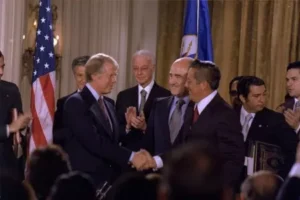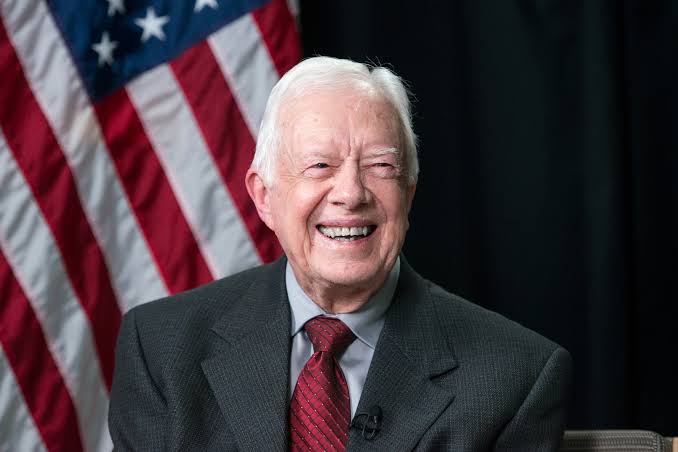Former President Jimmy Carter, who passed away on Sunday, often regarded the U.S. transfer of control of the Panama Canal to Panama as one of the defining moments of his presidency.
The signing of the Torrijos-Carter Treaties in 1977 marked a pivotal shift in U.S.-Latin American relations, setting a framework for Panama to assume full control of the waterway. The treaties included a provision that the canal would officially transfer to Panama on December 31, 1999, when U.S. involvement was terminated.
However, recent remarks by President-elect Donald Trump have reignited debates about the decision.
Trump claimed in an interview with Tucker Carlson last year that the U.S. “sold it under Jimmy Carter” for just “one dollar,” labeling the transfer as a giveaway that undermined American interests.
Recently he followed up the claim on his social media platform Truth Social, writing on December 21 that “Jimmy Carter foolishly gave it away for one dollar.”
Newsweek reached out by email to representatives of Trump’s transition team for comment.
After his first rally as president-elect, Donald Trump suggested that his new administration might attempt to regain control of the Panama Canal, which he claimed the United States had “foolishly” ceded to its Central American ally. He argued that shippers are charged “ridiculous” fees to pass through the critical transportation channel linking the Atlantic and Pacific Oceans.
Shortly after, Trump took to Truth Social to criticize President Jimmy Carter’s decision to return control of the Panama Canal to Panama.
“Teddy Roosevelt was President of the United States at the time of its building and understood the strength of Naval Power and Trade. When President Jimmy Carter foolishly gave it away for one dollar during his term in office, it was solely for Panama to manage, not China or anyone else,” Trump wrote.
The Torrijos-Carter Treaties were far more complex than a simple sale. They consisted of two key agreements: the Panama Canal Treaty, which outlined a 20-year transition for Panama to assume control of the canal, and the Treaty of Permanent Neutrality, which guaranteed the canal would remain open to international shipping.
The treaties sparked intense debate in the United States. President Jimmy Carter faced fierce opposition from conservative politicians such as Ronald Reagan, Strom Thurmond, and Jesse Helms, who argued the agreements would harm U.S. economic and military interests. Carter, however, defended the treaties as vital for correcting historical injustices and strengthening relations with Latin America.

Despite the opposition, intense lobbying, including unexpected support from actor John Wayne, helped secure Senate approval in 1978. This ratification was a pivotal step in formalizing the handover and embedding the agreements into U.S. law.
Contrary to Donald Trump’s claim, the U.S. did not sell the Panama Canal to Panama for $1. The treaties involved significant U.S. commitments, including $345 million in loans and military credits to support Panama’s transition. Moreover, the U.S. retained the right to defend the canal against threats. Historical records reveal that the U.S. had invested billions in constructing and maintaining the canal.
Today, the Panama Canal generates billions annually for Panama, serving as a major revenue source. However, growing Chinese investments in the region have sparked new geopolitical concerns.

False. The claim that Jimmy Carter sold the Panama Canal to Panama for one dollar is false. The transfer of the canal was part of a comprehensive diplomatic agreement, not a financial transaction. The treaties facilitated a gradual transition of control, backed by financial aid and training programs, to ensure Panama’s ability to manage the canal. Carter’s decision, while controversial, reflected a broader commitment to equitable foreign policy and remains a pivotal moment in U.S.-Latin American relations.





